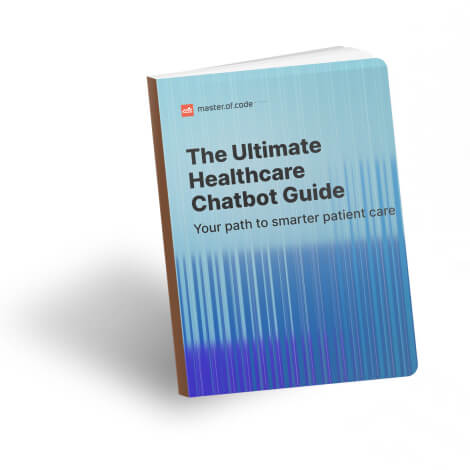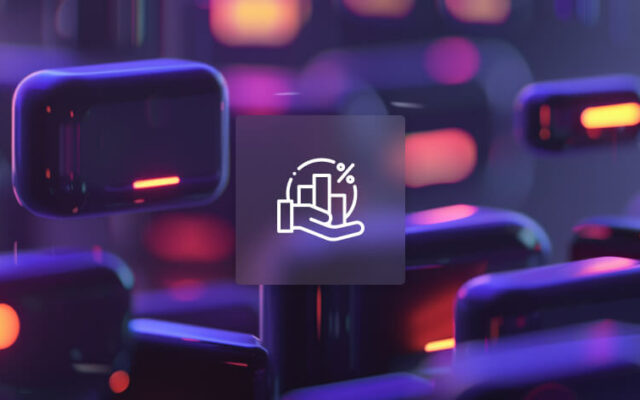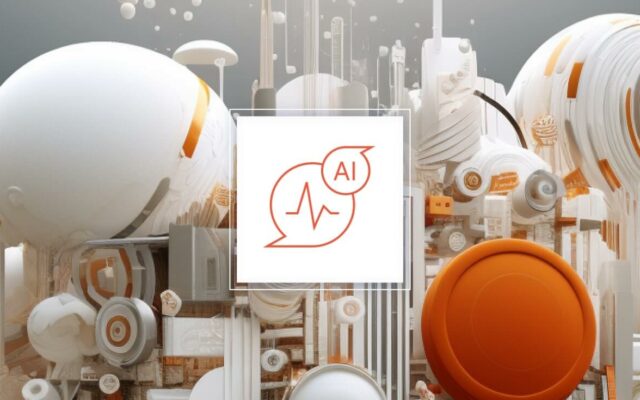In just a few years, Gen AI has moved from a research experiment to a transformative force in patient care. Hospitals, pharmaceutical firms, and insurers are now using these models to design new drugs, summarize clinical notes, and even simulate disease progression. According to McKinsey, Generative AI in healthcare could unlock up to $1 trillion in annual value across the sector globally, making it one of the most promising frontiers in digital innovation.
But how did we get here?
Traditional systems in healthcare were always limited to recognizing patterns or making predictions based on existing data. The AI technology in the medical field creates something new. It can generate structured health reports, produce synthetic data for research, and draft personalized treatment plans.
LLM-driven medical chatbots now triage patient symptoms and assist with reminders. NLP models powered by Generative AI in healthcare help clinicians create notes in seconds. Meanwhile, Google’s Med-PaLM is setting new benchmarks for accuracy in diagnostic and research tasks.
What if a single algorithm could shorten drug discovery by years, or predict a patient’s relapse before symptoms appear? This article explores the real systems making that possible right now and shows the real cost of AI in healthcare for your business.
Table of Contents
What is Generative AI in Healthcare?
This tech refers to a new class of intelligent systems. They are capable of creating new data, insights, or outputs rather than simply analyzing existing information. Unlike traditional AI, which classifies, predicts, or detects patterns, generative models can synthesize clinical notes, generate medical images, and even design new molecules for drug discovery.
At its core, Generative AI for healthcare relies on advanced architectures such as Generative Adversarial Networks (GANs), Variational Autoencoders (VAEs), and Large Language Models (LLMs) like GPT. These systems learn from vast amounts of real-world data. They produce original, contextually relevant content that supports healthcare professionals.
Key Types of Gen AI Models in Medicine
LLMs like GPT and Med-PaLM
These are trained on billions of documents and clinical notes to understand and generate natural language. They can create structured health reports, summarize patient visits, and assist doctors in drafting treatment plans.
Example: Google’s Med-PaLM Generative AI technology can interpret complex clinical questions, helping providers analyze lab data or suggest next steps in care.
Diffusion Models and GANs
Used primarily in medical imaging, these models produce highly realistic radiology scans or pathology slides, allowing researchers to generate patient models with different diseases. They help train diagnostic algorithms even when real patient data is scarce, protecting privacy while improving accuracy.
Variational Autoencoders
VAEs are essential in drug discovery and genomics. They are capable of generating new protein structures or simulating molecular interactions. They support pharmaceutical companies in identifying potential compounds faster and more cost-effectively, one of the fastest-growing Gen AI medical applications today.
How GAI Works with Healthcare Data
The algorithms process unstructured information, such as text, images, and signals, transforming it into structured, actionable intelligence. Here’s how Generative AI adoption in healthcare is applied across domains:
- Text and Language: It helps doctors generate a clinical note, extract key terms from EHRs, or produce discharge summaries, drastically reducing administrative burden.
- Medical Imaging: Diffusion models can enhance low-quality scans, detect anomalies, or compile synthetic MRI data for research, supporting hospitals where labeled datasets are limited.
- Genomics: By learning patterns in DNA sequences, these systems can generate new disease profiles, predict gene expression, or simulate patient-specific drug responses.
- Predictive and Simulative Modeling: Providers can now create treatment plans and even model disease progression scenarios to support personalized medicine.
These are just a few Generative AI use cases in healthcare that illustrate how personalization is reshaping patient outcomes and clinician workflows.
Gen AI in the Medical Field Statistics
- According to RootsAnalysis, the Generative AI in healthcare market is expected to reach USD 3.3 billion by 2026, growing toward USD 39.8 billion by 2035 (CAGR ~28 %)
- U.S. private AI investment reached USD 109.1 billion overall, of which USD 33.9 billion was invested in GAI globally — an 18.7 % boost from 2023.
- In the enterprise space more broadly, USD 4.6 billion went into Generative AI applications in 2024, nearly an 8× increase over previous years.
- Also, among institutions deploying AI, only 19 % report a high degree of success in clinical diagnosis applications, despite more widespread usage in imaging and risk prediction.
- The American Medical Association (AMA) reports that 66 % of physicians used health AI in 2024 — up from 38 % in 2023 (a 78 % relative increase).
- In U.S. hospitals, a recent study found that 65 % reported using AI-assisted predictive models to support care decisions, scheduling, risk stratification, or outpatient follow-up.
- Healthcare Dive reports that in 2024, 71 % of non-federal acute care hospitals were using predictive systems integrated into their EHRs, up from 66 % in 2023.
- However, adoption is uneven: small, rural, independent, and critical-access facilities lag behind. For instance, only 56 % of rural facilities used predictive technology compared to 81 % in urban ones.
- In terms of AI deployment breadth, a 2026 analysis shows hospitals typically apply AI/ML tools to just 1.4 out of 5 workforce-related functions (e.g., staffing, workflow, automation), and fewer than one-third use AI for scheduling or billing optimizations.
Benefits of Using Generative AI in Healthcare
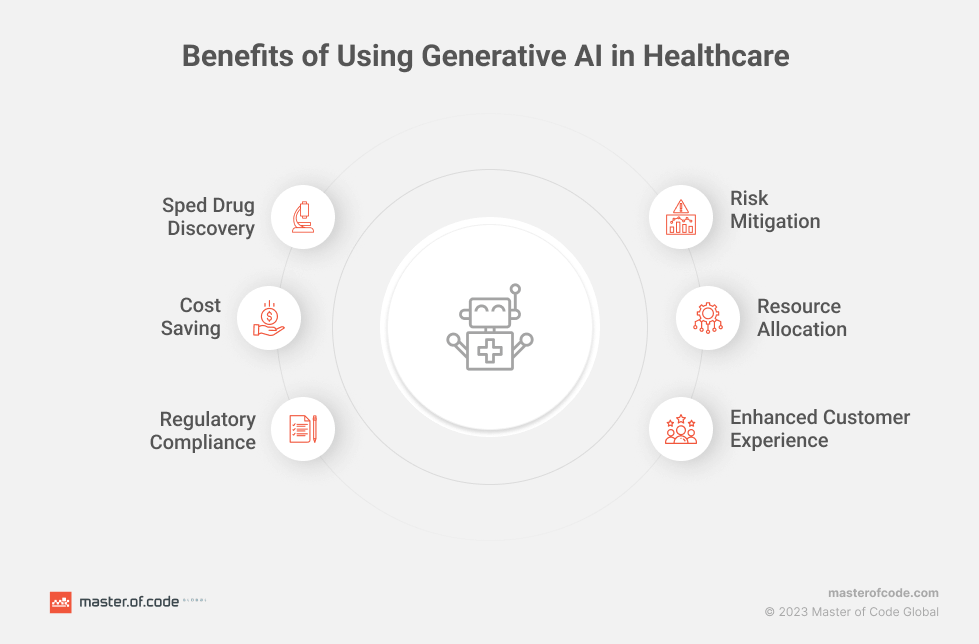
Cost Saving
The pharma industry can save significantly by adopting Generative AI in healthcare. The technology predicts when medical equipment needs servicing, preventing unexpected breakdowns and extending equipment lifespan. It also optimizes resource allocation, helping hospitals avoid costly downtime and operate more efficiently.
Beyond maintenance, automation is reshaping administrative and operational economics. According to Citi and McKinsey insights, automating documentation, medical coding, and billing could reduce administrative costs by 25–30%, a major relief in a sector where such expenses consume up to a quarter of total budgets.
In pharmaceutical R&D, Generative AI for drug discovery is compressing years of molecular research into months, reducing early-stage development costs. These systems simulate molecular behavior, predict compound viability, and minimize failed trials, saving millions per project. Hospitals and biotech firms also leverage synthetic data generation to safely train models without relying on real patient information, avoiding compliance delays and costly data acquisition processes.
Enhanced Diagnostic Accuracy
Generative AI in medical field helps enhance precision in diagnosing patients. Models like GANs and diffusion networks can convert low-quality or incomplete scans into highly detailed images, enabling early detection of diseases such as lung cancer or diabetic retinopathy. Hospitals, including Mass General Brigham, have already shown measurable gains in diagnostic accuracy using AI-enhanced imaging.
Beyond imaging, Generative AI integrates textual and numeric data, from EHRs, lab results, and physician notes, to generate comprehensive risk assessments. By correlating patterns humans may overlook, these systems support more confident, data-backed decisions. The outcome: fewer false negatives, faster treatment initiation, and stronger clinical confidence.
Improved Patient Outcomes and Personalized Care
One of the key benefits of Gen AI is that it allows medicine to become truly personal. By analyzing genetics, medical history, and lifestyle, it can generate treatment plans uniquely tailored to each individual. For example, AI models can simulate disease progression under different therapies, helping clinicians choose the most effective course before real-world intervention begins.
In drug development, similar algorithms predict how specific patient subgroups might respond to a new molecule, streamlining the path toward precision medicine. This fusion of simulation and personalization ensures care that’s not only reactive but proactive, improving recovery rates and long-term health outcomes across different populations.
Impact of Generative AI on Healthcare Efficiency
By automating repetitive administrative tasks like charting, reporting, and coding, the technology frees up clinical teams to spend more time with patients. Systems like Nuance DAX and Epic’s AI-assisted EHR integrations have already saved physicians thousands of collective hours in documentation, showing how healthcare practice with Generative AI can evolve toward greater precision and productivity. In fact, these tools have become instrumental in helping generative AI reduce physician burnout by minimizing repetitive administrative work and giving clinicians more time to focus on patient care.
But efficiency extends beyond paperwork. Other areas of improvement are: forecasting appointment cancellations, optimizing staff schedules, and generating real-time workload insights to balance patient flow. The net effect is a smoother, less error-prone system where clinicians focus on care, not clerical tasks, turning efficiency into a form of compassion.
AI for Healthcare Customer Service
Generative AI-powered medical chatbots and virtual assistants are redefining how hospitals and insurers interact with patients. This shift is driving growing demand for healthcare chatbot development, as providers look to build secure, compliant, and deeply integrated conversational solutions that scale across patient touchpoints. These solutions handle appointment scheduling, insurance queries, and post-visit follow-ups in natural language, 24/7, and at scale. Integrated into EHR and CRM systems, they ensure every patient gets timely, personalized responses without overwhelming staff.
The results are clear: lower call center costs, quicker replies, and better satisfaction scores. These assistants can also hand off complex issues to human agents, creating a smooth mix of automation and human support, essential for quality care.
Enhanced Patient Engagement and Satisfaction Metrics
Using smart technology, healthcare providers can deliver tailored notifications, education materials, and virtual check-ins that adapt to each patient’s progress. These systems can generate personalized appointment reminders, ensuring patients stay informed and on schedule with their treatments. Chatbots and voice technology in healthcare make these interactions conversational, helping patients feel supported between visits. AI-driven engagement also boosts adherence. By monitoring behavioral and biometric data, the system can predict when a patient might skip medication or appointments and proactively intervene. From our experience, hospitals leveraging these techniques report higher retention and satisfaction metrics – proof that personalization isn’t just efficient; it’s humanizing.
Generative AI Use Cases in Healthcare
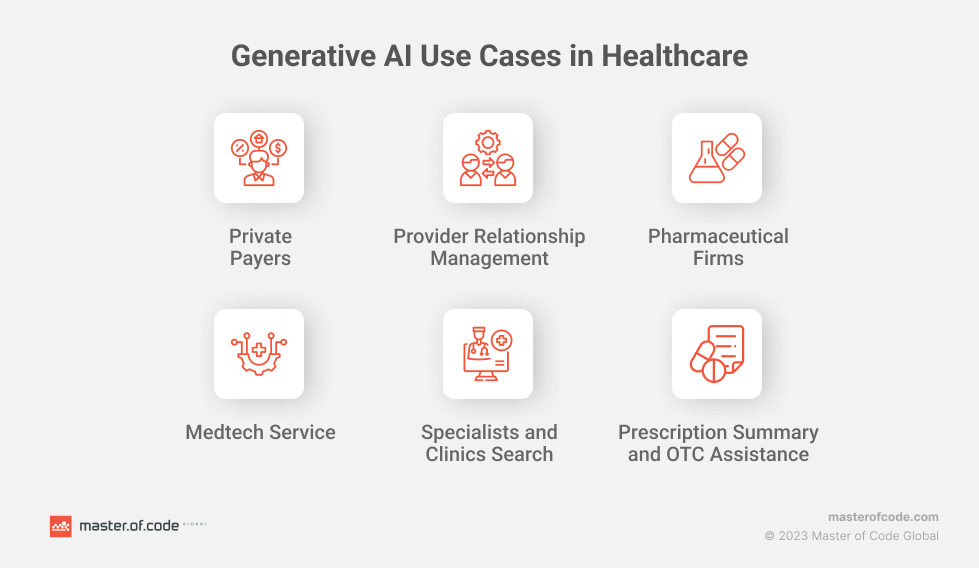
Drug Discovery and Development
One of the most transformative applications of Generative AI in healthcare is in drug discovery. A traditional approach can take over a decade and cost upwards of $2 billion. Generative models can simulate thousands of molecular combinations in silico, predicting which compounds are most likely to succeed in trials.
Companies such as Insilico Medicine and Recursion Pharmaceuticals use advanced algorithms to design and test new molecules digitally, reducing discovery time from years to months. These systems also enable drug repurposing, identifying new therapeutic uses for existing compounds by analyzing biochemical similarities. The results include accelerated innovation, lower costs, and a faster path from lab to patient.
Medical Imaging and Diagnostics
Another one of Gen AI use cases in healthcare is enhancing image resolution and reconstructing missing or distorted data in scans such as MRIs and CTs. This not only improves diagnostic precision but also makes imaging accessible in low-resource settings with older hardware.
Hospitals like Mass General Brigham and research teams at Stanford Medicine are already applying these tools to automate radiology and pathology reports. Moreover, generating synthetic medical data from imaging datasets allows AI models to train without exposing sensitive patient information, a vital step toward privacy-safe innovation. These improvements collectively help physicians detect diseases earlier and with greater confidence.
Personalized Medicine
The concept of “one-size-fits-all” care is rapidly fading. With Generative AI in medicine, treatment can now be tailored to each individual’s biology and history. Smart systems can analyze genetic data, environmental factors, and patient behavior to generate individualized therapeutic plans.
For example, predictive models can show how a patient might react to different treatments, helping doctors adjust prescriptions or dosages in advance. GenAI also supports personalized education by creating easy-to-understand materials about procedures or medications. This tailored approach improves care and helps build trust with patients.
Clinical and Administrative Efficiency
The administrative side of healthcare has historically been a cost sink, but intelligent automation is reversing that trend. Hospitals now use large language models like GPT or Med-PaLM to streamline documentation, generate clinical notes, and summarize patient histories automatically. For example, Microsoft’s Nuance DAX Express can transcribe and structure consultations in real time,
The technology also supports workflow optimization by forecasting appointment cancellations, automating billing, and generating structured health reports. This holistic automation allows clinicians to reclaim hours previously spent on paperwork, turning administrative time into patient time. When scaled across systems, these gains translate into measurable improvements in quality of care and financial performance.
Generative AI Solutions for Hospitals and Private Payers
AI systems automate claims processing, identifying inconsistencies or deceptive patterns before they escalate. According to McKinsey, payers using AI-driven review models have seen up to 20% reduction in fraudulent claims and significantly faster turnaround times.
On the member side, Generative AI healthcare assistants deliver personalized recommendations and benefit explanations, guiding patients through plan options or pre-authorization requirements. For example, the AI healthcare chatbot can clarify a denied claim, recommend in-network specialists, and even estimate out-of-pocket costs, empowering users while reducing support center volume.
Provider Relationship Management
In complex networks, smooth communication is essential. Gen AI helps streamline provider relationships by generating structured summaries, automated updates, and compliance reports. Hospitals can use it to analyze provider performance, synthesize feedback, and ensure data consistency across departments.
Generative AI for medical educators also supports physician decision-making with real-time access to synthesized clinical research. For instance, an assistant can scan thousands of journal articles and summarize the latest evidence on a treatment protocol, helping doctors make faster, better-informed decisions.
Pharmaceutical Firms
For pharma companies, Generative AI medical applications extend far beyond drug design. AI can automate research documentation, draft clinical trial reports, and even generate marketing and regulatory content that adheres to compliance standards.
Platforms like BioNeMo and Chemistry42 demonstrate how generative chemistry models accelerate R&D pipelines, while language models help medical writers summarize trial data or craft educational materials for healthcare providers. By reducing time spent on manual documentation, these systems give researchers more room to innovate and focus on breakthroughs.
Medtech Services
When it comes to medical devices, Generative AI in healthcare improves both their design and maintenance. By analyzing operational data, advanced systems predict device failures before they happen, ensuring real-time maintenance and uptime optimization. These predictive insights save hospitals from costly disruptions while improving patient safety.
Generative design algorithms can create optimized device prototypes – lighter, more efficient, and patient-specific. For example, orthopedic companies now use AI to simulate joint implants tailored to one’s anatomy, reducing recovery times and enhancing outcomes.
Specialists and Clinics Search
Finding the right healthcare provider can be complex, but AI-driven recommendation engines make the process faster and smarter. They can cross-reference patient preferences, such as location, language, specialty, and insurance coverage, to match patients with the most suitable providers.
These systems dynamically update directories, verify availability, and even surface reviews or treatment histories. AI for telehealth providers helps patients discover care options that meet both medical and logistical needs in real time.
Prescription Summary and OTC Assistance
Patients often find it hard to understand prescriptions or drug interactions. AI chatbots can help by explaining side effects and giving over-the-counter (OTC) advice in simple terms. For example, an assistant might send reminders to take medicine on time, warn about drug interactions, or explain how an OTC product could affect their treatment. This makes things easier to understand and helps patients follow their care plans more accurately.
Clinical Decision-Making and Diagnostic Support
In medical settings, Generative AI for healthcare functions as an intelligent co-pilot. By synthesizing data from EHRs, lab results, and imaging, autonomous systems can provide risk predictions for catastrophic health events like cardiac arrests or strokes. These models continuously learn from patient data, helping physicians prioritize high-risk cases early.
AI-powered decision support tools can also simulate “what-if” scenarios, testing potential treatment paths before real-world application. This not only minimizes human error but also strengthens clinical confidence, leading to faster and more precise interventions.
Real-World Examples of Generative AI in Healthcare
1. AI-Driven Clinical Decision Support
A healthcare organization sought to democratize specialized medical expertise across its network, ensuring that every patient could receive the same quality of care. Master of Code Global led the strategic discovery and proof-of-concept (POC) for an AI-powered clinical decision support system capable of providing real-time diagnostic assistance to providers with varying experience levels.
Our team evaluated next-generation models like MedLM, GPT-4.5, and Gemini, integrating them with medical guideline repositories via a retrieval-augmented generation (RAG) framework. This hybrid system not only enhanced accuracy but also maintained 100% HIPAA compliance through secure data pipelines. In POC testing, clinicians achieved 3× faster diagnostic decisions and a 300% projected ROI within two years.
2. Conversational AI for Healthcare Engagement and Triage
For a regional healthcare network serving over 2.3 million people, administrative overload and long wait times had become systemic challenges. Master of Code Global developed an intelligent triage and communication platform that functions as the first point of contact for patients, automating symptom assessment, scheduling, and insurance verification while maintaining empathy and clinical safety.
The platform integrated with Epic and Cerner EHR systems to deliver real-time responses through web, phone, and chat interfaces. Using validated triage logic, the AI assistant could differentiate urgent cases from routine ones, instantly escalating emergencies to medical professionals. The outcome was transformative: a 63% reduction in average wait times, 47% fewer abandoned calls, and an 89% satisfaction rate among patients.
3. A Pocket-Sized Pharmacy App
For one of Canada’s largest insurance providers, medication management had become a key barrier to patient adherence. Master of Code Global created a comprehensive iOS application that acts as a companion, offering personalized reminders, predictive refill management, and real-time interaction analysis.
This pocket-sized digital pharmacy leverages AI to monitor drug interactions, correlate symptoms with treatment outcomes, and provide patients with accurate, conversational guidance. It even features voice-activated functionality for accessibility. Results included a 43% reduction in medication-related support inquiries, secure processing of over one million medical records, and a 320% expansion of the drug database through AI-driven aggregation.
4. CSource Cancer Awareness Chatbot
CSource, founded by cancer survivor Jonno Boyer-Dry, envisioned a single hub for patients and caregivers to find reliable, compassionate information about cancer care. The original chatbot lacked intuitive navigation and scalability, making it difficult for users to access help when it was needed most. Master of Code Global rebuilt the platform into an AI-powered assistant – a centralized, empathetic guide that simplifies the search for credible medical and emotional resources.
The updated chatbot now features thematic content flows, integrated search functionality, and vetted sources like the American Cancer Society and MyLifeLine.org. It supports 1,500 active users, covers 89 cancer types, and curates 75 essential references, all within a user-friendly, visually guided interface. By leveraging Conversational AI, CSource turned fragmented online data into accessible, humanized support for patients and their families.
5. AI-Powered Clinical Decision Support System for Healthcare
A leading healthcare provider turned to Master of Code Global to develop an AI-powered clinical decision support system that would assist healthcare professionals in making faster, more accurate diagnostic decisions. Existing systems were slow, lacked integration, and didn’t provide the real-time support needed in clinical environments. The solution was to build a system that could integrate seamlessly with the provider’s existing infrastructure while ensuring the system could scale and meet the needs of clinicians.
Master of Code Global created a robust, AI-driven system that combines MedLM, GPT-4.5, and Gemini, along with reasoning engines, to support clinical documentation and diagnostics. The system was designed with a Retrieval-Augmented Generation (RAG) framework, pulling from authoritative medical guidelines to offer real-time, reliable insights. The solution demonstrated a 3x increase in diagnostic decision-making speed during POC testing, while also ensuring full HIPAA compliance. By leveraging these advanced AI models, the system was able to deliver accurate and timely support, making it an invaluable tool for healthcare professionals.
6. AI Chatbot for Biotech Firms
A Fortune 500 biotechnology and pharmaceutical service provider partnered with Master of Code Global to modernize internal communication for its global support teams. Operating across 300,000+ locations, the company required a scalable platform that could connect agents to supervisors in real time, ensuring fast and accurate customer support in highly regulated environments.
We built a secure AI-powered chatbot that connects with the company’s CRM (SAP C4C). It helps teams escalate issues quickly, share advice, and give feedback in real time. The chatbot tracks key details like agent background and query history, so responses are faster and more accurate. This led to quicker resolutions, better team efficiency, and higher customer satisfaction across six major healthcare and science sectors.
Challenges and Ethical Considerations
Accuracy and Reliability
Medical decision-making depends on precision. Generative AI in healthcare systems can sometimes produce plausible but incorrect results, known as “hallucinations.” Such errors could lead to harmful recommendations or misdiagnoses. Ensuring model accuracy requires continuous validation against peer-reviewed medical data, rigorous benchmarking, and domain-specific fine-tuning. AI outputs should always be verified by clinicians before influencing care decisions.
Data Privacy and Security Concerns
Healthcare data is among the most sensitive information in existence. That’s why many organizations complement privacy controls with AI powered fraud prevention, using anomaly detection and behavioral analysis to identify suspicious activity before financial or clinical harm occurs.
Bias and Fairness in AI Models
Bias in any medical solution can perpetuate existing inequalities if not properly addressed. Generative models trained on skewed or incomplete datasets may perform differently across populations, leading to unequal diagnostic accuracy or care recommendations. To promote fairness, organizations must use diverse datasets, apply bias detection frameworks, and involve interdisciplinary review teams in model testing and deployment.
Accountability and Transparency
Healthcare providers and regulators still face the question of who is responsible when an AI-generated recommendation leads to an error. Transparent AI systems must document their data sources, training processes, and reasoning paths. Clear accountability frameworks, where both AI developers and medical institutions share responsibility, are necessary to maintain public trust and ensure ethical deployment.
The Need for Human Oversight and Interpretability
Generative AI in healthcare should complement, not replace, medical professionals. Human oversight is crucial to interpret AI recommendations, identify anomalies, and provide contextual judgment. Clinicians must understand why a model made a certain suggestion to trust and use it effectively. Building interpretable systems with explainable outputs helps bridge the gap between automation and human expertise, fostering responsible adoption across healthcare environments.
Applications of Generative AI in Healthcare: From Idea to Implementation
You’ve seen how GenAI is reshaping the industry, from speeding up drug discovery to automating diagnostics and patient interactions. The question now is: how do you move from exploring use cases to actually building something that works in your organization?
As Olga Hrom, Director of Pre-Sales Strategy & Delivery at Master of Code Global, explains:
Below are six practical steps drawn from our implementation experience that can help you move from concept to production, without getting lost in experimentation.
Step 1
Before adopting Generative AI in healthcare, define what problems you’re solving, and why they matter. Are you reducing administrative load, improving diagnostic accuracy, or enhancing patient engagement? Anchor each initiative to measurable outcomes such as shorter report turnaround times or higher staff productivity.
Step 2
High-quality data is the backbone of every successful medical AI system. Start by auditing what you already have – electronic health records, imaging data, and claims information – to identify gaps in accuracy or consistency. Then, collaborate with providers and insurance companies to enrich your dataset and ensure broader, more reliable, and interoperable data coverage across systems.
Step 3
Assess whether your existing systems can support Generative AI workloads, including APIs, storage, and secure compute environments. A strong foundation allows for seamless scalability later. If modernization is needed, collaborate with an experienced AI healthcare software development company to align architecture, data pipelines, and privacy protocols.
Step 4
In healthcare, privacy and strong governance are key. Work with partners who follow HIPAA, GDPR, and PIPEDA rules and use secure practices like encryption and role-based access. Starting with these safeguards builds trust with doctors, staff, and patients from the beginning.
Step 5
Even the smartest open-source tools can expose sensitive data if unmanaged. Set clear internal rules on how AI is used, what data it accesses, and how outputs are validated. Responsible governance ensures ethical, compliant, and secure adoption across departments.
Step 6
Finally, select a vendor that not only understands medical workflows but also provides end-to-end expertise, from healthcare AI consulting to implementation and optimization.
At Master of Code Global, our specialists help organizations accelerate innovation through secure integration frameworks and middleware data-exchange systems. Whether you’re building an intelligent triage system or integrating AI chatbot features into your existing Conversational AI platform, we ensure compliance, interoperability, and measurable ROI.
Future of Generative AI in Healthcare
Agentic AI: From Support to Independent Action
AI agents will help medical systems work more independently. They can spot health risks, adjust treatment plans, and take actions like booking follow-ups or updating records. In emergency care, they can catch early warning signs and alert doctors before things get worse, leading to quicker treatment, fewer mistakes, and better patient care overall.
Integration with Robotics, IoT, and Precision Medicine
Generative AI will team up with robots and smart medical devices to make healthcare more responsive. Surgical robots will learn from past procedures to improve performance. Wearables and implants will send real-time data to AI systems, which can then customize treatment or catch early warning signs. This helps doctors deliver care that fits each patient, rather than using the same approach for everyone.
Beyond clinical applications, Generative AI in medical training will transform how future healthcare professionals learn and practice. AI-simulated case studies, virtual patient interactions, and adaptive learning environments will allow medical educators to train students in real-world scenarios safely and effectively.
Regulatory Landscape and Compliance Evolution
Global regulators are quickly building rules for AI in the medical sector. Agencies like the FDA, European Medicines Agency, and Health Canada are focusing on safety, transparency, and clarity. Following standards like HIPAA, GDPR, and ISO is still a must. Companies that follow these rules early will earn more trust and stay ahead in innovation.
As adoption accelerates, one question remains. How do you turn these promising AI capabilities into dependable, scalable systems? As a leader in Generative AI software development in healthcare, we help clients design scalable systems. Talk to our experts to explore how to integrate intelligent automation and Generative AI solutions for highly regulated industries into your operations today.





